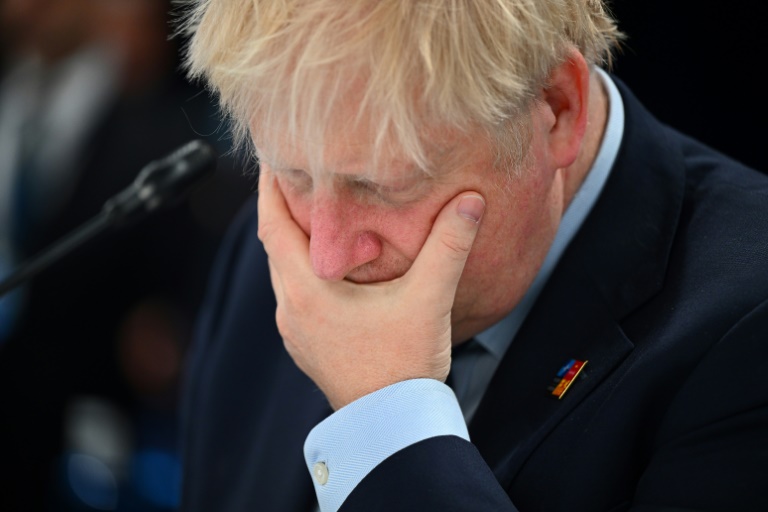UNITED KINGDOM
Defiant Boris Johnson refuses to step down despite a flood of resignations Access to the commentsCOMMENTS
By David Mac Dougall & Kit Gillet with AP, AFP • Updated: 06/07/2022 – 22:50
British Prime Minister Boris Johnson outside 10 Downing Street
British Prime Minister Boris Johnson outside 10 Downing Street – Copyright AP Photo
SHARE THIS ARTICLE
embed
facebook
twitter
flipboard
mail icon
A defiant Boris Johnson is refusing to step down as prime minister of Great Britain, despite a flood of resignations from MPs critical of his leadership, and a group of cabinet ministers telling him in Downing Street that his time is up.
Johnson rejected demands that he step down during a stormy session of the House of Commons on Wednesday afternoon, in the wake of a furor over his handling of sexual misconduct allegations against a senior official.
Later in the day, a delegation of some of his most trusted allies paid a visit to Johnson to urge him to go, Britain’s Press Association reported.
But the prime minister rejected suggestions he should seek a “dignified exit” and opted to fight for his political future, citing “hugely important issues facing the country,” according to the news agency. It cited a source close to the prime minister as saying he told his colleagues there would be “chaos” if he quit.
Johnson is now said to be looking to fill the empty positions after more than three dozen resignations from his government, and late Wednesday evening fired one of his senior allies Michael Gove for not being sufficiently loyal.
Who quit the government?
Boris Johnson finds himself in the dubious position of having the most ministerial resignations in a single day of any prime minister in British history.
The first resignations came on Tuesday night within minutes of each other as Chancellor of the Exchequer Rishi Sunak and health minister Sajid Javid released apparently coordinated statements saying they couldn’t continue to give Johnson their support.
Wednesday started with a slew of other resignations of less prominent MPs, and by mid-afternoon, there had been at least 26 in total: including the initial two cabinet ministers, ministers, principal private secretaries, trade envoys and a vice chair of the Conservative Party.
That total had climbed to 42 resignations by Wednesday evening.
Why have the Conservatives fallen out of love with Boris Johnson?
One batch of ministers to quit didn’t even write individual letters, five of them just added their signature to a group message for Johnson.
What happened during PMQs?
Boris Johnson faced MPs at Prime Minister’s Questions on Wednesday afternoon in a defiant mood, saying: “The job of a prime minister in difficult circumstances, when you’ve been handed a colossal mandate, is to keep going”.
On Wednesday, Johnson said he acted swiftly after hearing the allegations against Pincher.
Opposition leader Keir Starmer called his response pathetic and labelled the Conservatives who hadn’t resigned amid recent scandals “the charge of the lightweight brigade”. He also referred to the current cabinet as a “Z-list cast of nodding dogs”.
Later ex-health minister Javid explained in more detail why he had resigned.
“Treading the tightrope between loyalty and integrity has become impossible in recent months, and Mr Speaker, I will never risk losing my integrity,” Javid told the House of Commons.
“I also believe a team is as good as its team captain and that a captain is as good as his or her team. So loyalty must go both ways. The events of recent months have made it increasingly difficult to be in that team.”
Singling out a series of events, from lockdown parties to sexual misconduct allegations against a senior Conservative lawmaker, Javid said “we have reason to question the truth and integrity of what we’ve all been told and at some point, we have to conclude that enough is enough. I believe that point is now”.
What’s the background to the latest crisis?
So what has triggered this latest political crisis in the UK for Johnson’s government – which seems to have lurched from one scandal to another in the last six months?
At the heart of it is how Downing Street handled the issue of Chris Pincher, an MP who quit his post after admitting to being drunk and groping two men in a private London club.
Johnson appointed him as deputy chief whip earlier this year, despite being aware of misconduct allegations against him.
Some MPs said they were frustrated that 10 Downing Street couldn’t get its story straight about what Boris Johnson knew, and when, and were undermined by doing media interviews to back up the PM’s position only to have it change within an hour or two.
An astonishing letter from the former head of Britain’s diplomatic service laid out very clearly that Johnson had known in far more detail than he’d admitted, historical complaints against Chris Pincher when Johnson was British foreign minister, and Pincher was a minister in the same department.
Minutes before the resignations of Javid and Sunak were announced, Johnson said Pincher should have been fired from the government after a previous 2019 incident.
Asked if it was an error to appoint Pincher to the government, Johnson said: “I think it was a mistake and I apologise for it. In hindsight, it was the wrong thing to do.”

























